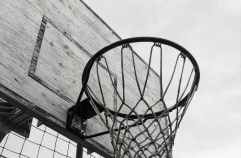This post is the second of two posts recapping Georges Niang’s journey to the NBA. In the first post, Niang analyzed the roles that his focus, motivation, and humility played. Continuing on the theme of a player’s makeup, Niang discusses the qualities of accountability, leadership, and perseverance.
Niang on Accountability
Niang told us that accountability is the most important value he learned in his journey to the NBA. In eighth grade, he attempted and failed to convert a behind the back lay-up. His coach, Rick Gorman, immediately took him out and sat him for the rest of the game. Niang told us the behind the back attempt was uncharacteristic of his game. It was also completely unnecessary in order to score on that play. Gorman joked that the team also owned a 25 point lead, but Niang seemed to only remember the principle of the benching. Three years into his NBA career, he remembers the play and the consequence well. It obviously made an impact.
Niang acknowledges that coaches cannot dish out consequences every moment and expect success. In fact, in his own example, what stood out to him about Gorman’s decision was the positive relationship with the coach. He knew to be humble enough to self-reflect because of where the feedback came from. While Gorman proved tough on Niang in this episode, he also was a tremendous advocate for him in other circumstances. He trusted Niang to play against anyone and outcompete them. And Niang sensed that his coach supported him and believed in him.
My own conclusion from Niang’s anecdote is that coaches need not worry about placing themselves in a category of authoritative or a “player’s coach”. Instead they need to coach the play immediately in front of them and react. Whatever is in the best interests of the player in the long term is what counts. And that means giving positive reinforcement as well as critical feedback.
Accountability in the NBA
Niang connected the lessons he learned on accountability as a youth to where he is today. When he was going through the draft process, an NBA team knew that he was suspended for a day in the 7th grade. He owned it. Something that happened when he was barely a teenager matters. Character matters.
As a middle school teacher, I got goosebumps. Every year there is a student that is ambitious enough to want to make the NBA or WNBA. Sharing this anecdote with these students hopefully helps them reflect on how much their actions matter in the present.
Niang on Leadership
Georges Niang and his family determined that prep school was the best option for him in high school. Although basketball was important, the smaller class sizes of Tilton Academy was essential for his education.
Due to being in a boarding school, his life quickly became engulfed by basketball. He spent a large amount of time with his teammates. One of those people was Alex Oriakhi.
Oriakhi was a senior while Niang was a self-proclaimed chubby freshman at the time. Oriakhi had already accepted a scholarship from Jim Calhoun and the University of Connecticut. Niang quickly learned from Oriakhi. He got to see up close that Oriakhi’s talent was undeniable, but it was Oriakhi’s approach to the game that made Niang want to emulate him.
Do Uncommon Things
I’m paraphrasing, but Oriakhi essentially told Georges Niang that if you want to do uncommon things, you have to do uncommon things. The social incentives for teenagers is to follow other teenagers. Being a follower will make you more likable, and more importantly avoid embarrassment. Oriakhi had habits that set him apart from the typical student-athlete. He would get up early in the morning to shoot. He passed up unhealthy foods in the cafeteria. And he found time and reason to lift weights consistently. Oriakhi was an atypical teenager that was not influenced by his peers. He was leadership personified.
Niang was still really young and did not play much that freshmen season, but Oriahki’s leadership was crucial to his development. It set in motion the level of discipline involved in the process in separating yourself from your peers. It helped him see the choices you make do not need to conform to the norm. Niang’s conclusion on reflecting on the experience of learning from Oriakhi was for me the line of the night: “One hundred percent effort and showing up are the bear minimum.” To separate yourself from the competition, you have to be willing to make sacrifices that go past what the team mandates.
Leadership Examples
Niang cited Utah Jazz guard Donovan Mitchell as an excellent leader. Mitchell proactively involves everyone when the team gets together off the court. He organizes team dinners, golf experiences, etc. Mitchell wants to bring people together and recognizes the value of growing relationships off the floor with all his teammates.
Niang connected leadership back to the people he was addressing in the Zoom conference – high school coaches. Reflecting back on his experience and the peers around him at the time, he told us he believes that coaches absolutely have the power to help develop a player’s intrinsic motivation. He admits that high school coaching is inherent with challenges. For some players, basketball might be a distant priority to other sports. It might just be a means to an end in terms of staying in shape or throwing a bullet point on a college résume. At any rate, Niang told us that coaches have the power to make their players believe they are big and powerful. They have the ability to get players to run through a wall for the good of the team.
Niang on Fighting through Adversity
Niang had a setback toward the end of his sophomore season. In the second round of the NCAA tournament he wound up breaking a bone in his foot. Iowa State still advanced to the Sweet Sixteen before losing to UConn who eventually won the whole tournament. Despite being named to the all-freshmen team and Iowa State being Final Four caliber his sophomore season, Niang considered himself immature at the time. While recovering from injury, he found himself opting for chicken fingers over salads far too often. The example and wisdom of Oriakhi and others crept back into his mind while at the same time other people started doubting him. All of it led to a positive change in motivation and habits.
He began a routine that set him up with six days per week of strict discipline. There was no longer an excuse of “I don’t feel like getting shots up” or “I don’t want to lift.” He became fixated on getting one percent better and small gains every time he took some action step. The routine led to accountability. Adversity’s best cure is most often a healthy routine.
Routine Stays with Him Today
The lessons from the injury and the way back are still serving him today. He still fights complacency especially before he arrived in the Orlando bubble. The temptation to indulge in chocolate chip cookies is tremendous when the finish line is so far off. At the same time, the margin for Niang to maintain success playing at the highest level is so small. Everything matters and a slight alteration to his diet compromises his routine. He will plan a cheat day in advance here and there, but the emphasis is still on making minimal daily improvements. As he put it, “Consistency is undefeated.”



